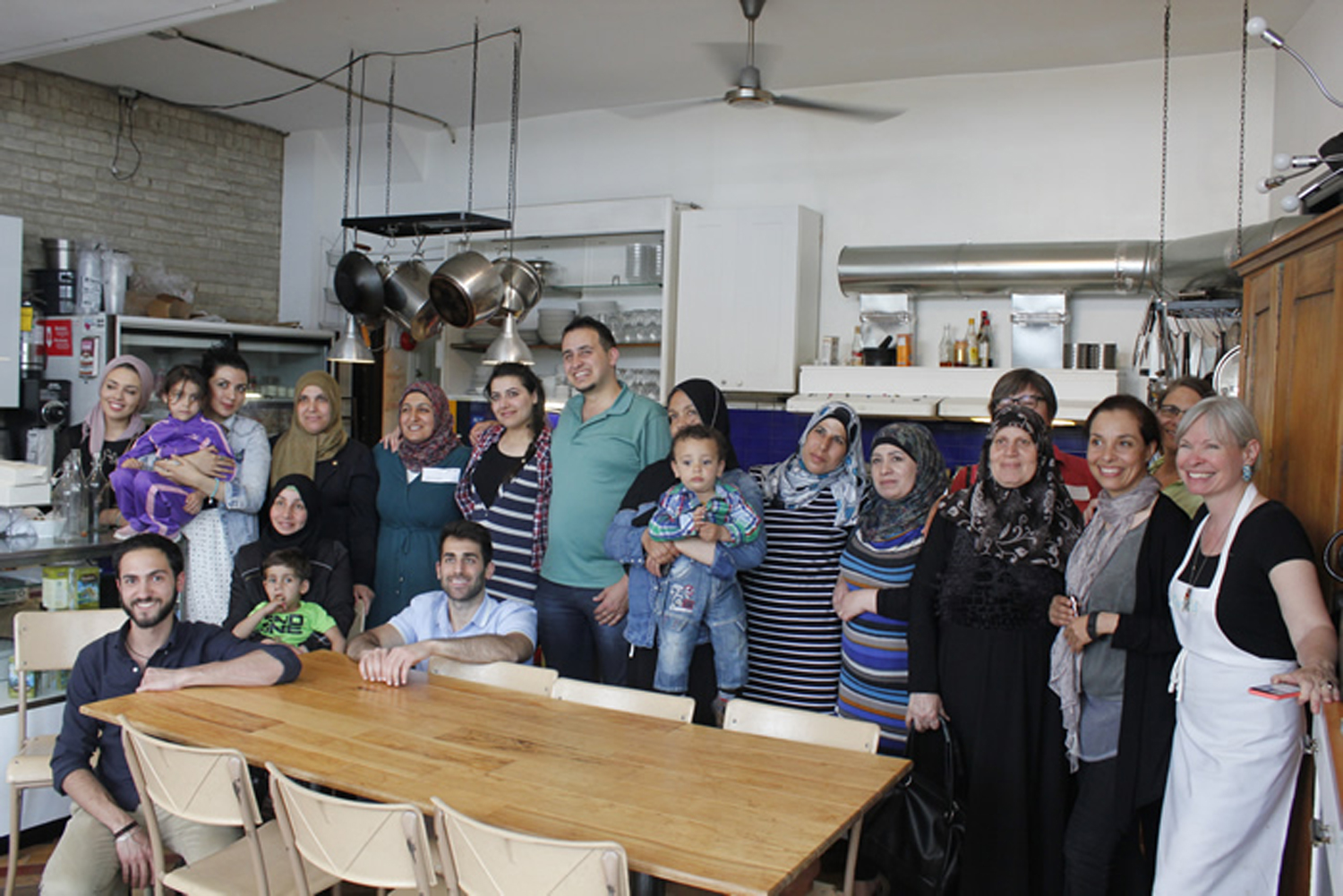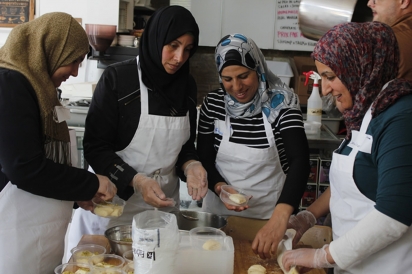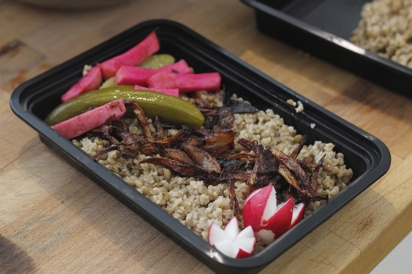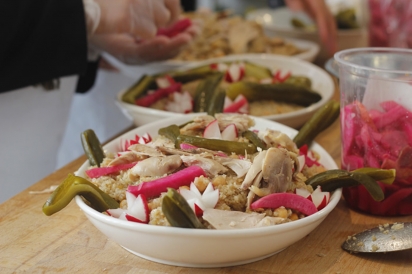Newcomer Kitchen at The Depanneur Builds Community for Syrian Refugees
I walked into The Depanneur on an uncharacteristically balmy day in early June. Maybe it was because spring weather had been sparse this year, but the sunshine and the heat of the afternoon permeated in a visceral manner. It signaled a season of renewal. People were smiling at one another while passing by on the street. Toronto had emerged from its winter shell, physically and emotionally.
The sunlight careened through the broad northwest-facing windows of the community kitchen-cum-restaurant-cum-social hub. The warmth inside was not just a product of the heat. The atmosphere at The Depanneur that Thursday afternoon was incubative.
At the periphery of the gathered group were young children dancing on tables, holding their fathers’ hands for support, while others were doing arts and crafts or napping in their strollers. A documentary film crew circled the perimeter, discussing shot angles in hushed tones. Several apron-clad women with nametags casually but methodically delegated tasks, balancing between clear directives and spur-of-the-moment decisions.
At the core of it all were eight women.
A few months earlier these women and their families had been cooped up in hotels on the outskirts of Toronto, at the tail end of a long, difficult, and uncertain journey from cities and villages across Syria to a new home in Canada. (Canada welcomed over 25,000 Syrian refugees between November 2015 and February 2016.) They now frequently find themselves in the centre of this bustling communal kitchen on College Street West singing Arabic songs, sharing stories, and cooking with one another as part of the Newcomer Kitchen program at The Dep, as the establishment is fondly called.
Owner Len Senater began this initiative in order to provide kitchen facilities so Syrian mothers could make meals for their families while they were living in hotels awaiting permanent housing. The program swiftly evolved into an entrepreneurial venture for the cooks that centres around a meal service for the general public. Plans are also in the works for several other programs that have the potential to nurture this new Syrian diaspora community, promote culture sharing between new immigrants and native Torontonians, and carry on an ancient culinary tradition whose matriarchal roots span thousands of years.
The Depanneur is a melting pot for the culinary community, “a space where interesting food things happen,” and where professional and home cooks can come together to share stories, skills, and soirées through food. The Dep hosts a variety of regularly scheduled and pop-up events, including drop-in dinners, workshops, supper clubs, brunches, and collaborative culinary initiatives like the Newcomer Kitchen that seek to enrich the edible landscape of Toronto. The Dep has two licensed commercial kitchens: the basement space is dedicated to long-term renters—a co-working space for food, which at present is almost fully booked; the street-level kitchen is available for rent at $25.00 per hour most weekdays before 3 pm, and later on some nights, but lacks onsite storage.
I took my time surveying my surroundings when I arrived at The Dep that day at 2 p.m. Most of the crew had already been there for the better part of five hours. The air was thick with the smell of roasted chicken bones used to make deep caramel-coloured chicken stock. Aromatic bulgur wheat was cooked in the stock. Chickpeas and chicken were boiled with bay leaves, cinnamon, black pepper, and cardamom. Three women were packing salateh naameh, a finely chopped salad of cucumber, tomato, onion, mint, and lemon juice, into takeout containers, while another group had formed an assembly line to cut and package freshly baked halawet el jibn (sweet stuffed cheese rolls), and top them with sugar syrup and crushed pistachios.
Rula Ajib floated amongst the stations ensuring that presentation was just so and that there were sufficient quantities of each meal to fulfill the fifty orders placed that week. Len had called Rula in as an emergency translator during the first round of Newcomer Kitchen. A volunteer with the Arab Community Centre of Toronto, she had been spending 12-hour days at the hotels as a translator, helping refugee families navigate paperwork and housing placements and putting out many minor fires as they looked to start new lives here.
Len admits that they had thrown things together so quickly the first time, they forgot that they needed a way to communicate! “Lucky for us, it turned out that Rula wasn’t just a great translator, but she was also a phenomenal cook.”
Rula has now assumed the role of culinary director for the program. She’s meticulous in her assessment of the women who participate, ensuring that no dish is made without a true “expert” at the helm. “When we decide on a menu, it’s because we know we have the right women who can cook each dish authentically,” she explains. “Everyone here takes a lot of pride in what they’re sharing.”
What’s more, the women who cook are also learning about their Syrian neighbours here in Toronto—teaching one another about new dishes and regional recipes they’ve never seen before despite having lived in the same country.
Newcomer Kitchen meals are made available for pre-order to the general public on The Depanneur’s website every Tuesday morning at 7:00. The week I was there they were sold out by noon. The meals include both meat and vegetarian options, and they’ve also made a guest-cook spot available for $50, whereby someone gets to cook (and learn) alongside the women for the day. Proceeds are used to cover operational and ingredients costs, and the rest is distributed directly to the women involved. The day I visited, each walked away with $90 in hand, which translates to about $15 per hour for dignified, engaging, and purposeful work.
“This changes the response to the immigrant situation from charity to a true value exchange, and we’re using food to connect this bridge,” says Len.
Support for the project has come with far greater enthusiasm than he ever expected. Many are donating above and beyond the $20 price of a meal, which are available for Thursday pickup at the shop or delivered free within a 3-kilometre radius thanks to a sponsorship by Foodora. There’s a lineup of local community members looking to volunteer, and the project has garnered media coverage from Huffington Post, Vice, and the CBC, among others. And the roster of about thirty Syrian women who get called in to cook continues to grow.
“There’s something about this project that’s resonating with Canadians,” Len continues. “Part of it is reclaiming our identity.”
Once the fifty meals had been properly packaged, Rula and some of the other women prepared platters of burgul behommos– bulgur and chickpeas, topped with shredded chicken and zesty pickled cucumbers and turnips. The fragrant mixture was served with dollops of yogurt and an accompanying salad. The room mellowed out briefly as the crew took a break to eat, and I got a chance to chat with Rahaf Al Akbani, 25, and Esmaeel Abofakher, 28, of The Welcome Project, a couple who have been Senater’s right hands in coordinating much of this endeavour.
Young, ambitious, and gregarious, the husband-and-wife duo, originally from Sweida, Syria, have only been in Toronto (via Lebanon and Turkey) since mid February. In this short period of time they’ve already managed to apply their backgrounds in social work, nursing, teaching, and language to help facilitate the logistics and implementation of the program.
“As soon as we arrived here we used public transit,” Abofakher explained. “We wanted to learn all about the city. But many of the other families had to stay in the hotel. They didn’t know the language or how to get around.”
Beyond a language barrier, many of the new entrants were coming from rural villages where they’d never ridden an escalator, let alone seen a subway. “We have women who have come here with doctorates and others who are illiterate farmers,” Len elaborated.
Adapting to and understanding new surroundings is yet another tangible benefit of the Newcomer Kitchen, but the community building and the economic upside both within and outside of The Depanneur are perceptibly invaluable.
“We’re working on a number of other projects to fulfill the demand and increase the financial benefit to these women,” Len continues. “The primary idea is that this concept can take place in any kitchen, with any newcomer group, in any city in the world.”
Senater and the team have already hosted two Syrian brunches at the Butler’s Pantry restaurant in Mirvish Village and he hopes to expand to a full-fledged pop-up restaurant in the fall before that restaurant is forced to close due to condo development. He’s begun working with Dufferin Grove Park to start a bread-baking program using their communal ovens, and another with Prairie Boy Bakery to produce enough for the brunches. To bring the sustainability of the project full circle he’s also in talks with Greenest City and Building Roots to conceptualize a gardening project for the women to plant ingredients for the brunch.
“The culinary heritage in Syria is one of the oldest in the world, passed down by mothers and daughters, and not necessarily written,” Senater explained. “There are six million Syrians living in the diaspora and it’s a real worry that this cultural cuisine is in danger of going extinct.
“There’s value in the things you don’t know,” he continued, “so we need to ask ourselves: how can we monetize that value in a new place? We’ve been a country for under two hundred years and we’re quickly depleting our resources beyond repair. These cultures have sustained themselves for thousands of years. If we can figure out how to listen and try to unlock what they have to teach us, maybe we can learn something incredibly useful before it’s too late.”
Of course, with the cultural mosaic that exists in Toronto, it’s fitting that our city could become a sort of Petri dish for the perpetuation of traditional Syrian cuisine. Yet this truly is just the tip of the iceberg. This is but a small fraction of the population of new refugees who will struggle to find work, continue to have their professional skills undervalued, and be forced through the bureaucratic feeding tube before being spit out into fractious industries of employment and disparate areas of the city. There isn’t even a single Syrian restaurant in Toronto.
While it will undoubtedly take time for projects like Newcomer Kitchen to develop and for refugee communities to find their place within Canada’s fabric, it is imperative to start somewhere, to lend a hand where and when needed. To nurture culture, learn from one another. And for The Depanneur and Torontonians alike, food is a familiar and fitting entry point.
The Depanneur
1033 College St., Toronto
(416) 828-1990








